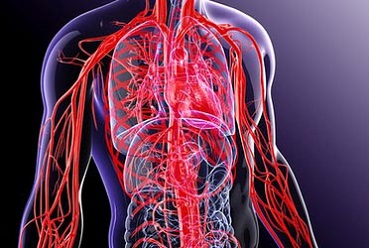Cytokines from COVID-19 spike-activated macrophages present a new threat to blood vessel health
Nikhil Prasad Fact checked by:Thailand Medical News Team Jul 31, 2024 1 year, 5 months, 3 weeks, 3 days, 47 minutes ago
COVID-19 News: Recent research from the University of Parma, Italy, sheds light on the complex interplay between COVID-19 and vascular health. This
COVID-19 News report explores how cytokines released by macrophages activated by the SARS-CoV-2 spike protein can impede the growth and functionality of endothelial cells, leading to severe complications.
 Cytokines from COVID-19 spike-activated macrophages present a
Cytokines from COVID-19 spike-activated macrophages present a
new threat to blood vessel health
Unmasking the Culprit Behind Endothelial Dysfunction
Endothelial cells line our blood vessels, playing a crucial role in maintaining vascular health. Endothelial dysfunction (ED) is a condition where these cells lose their ability to regulate blood flow, leading to complications such as lung injury, heart problems, and blood clots. The study findings focuses on how COVID-19 exacerbates ED through the action of cytokines.
The Study in Focus
Researchers Giulia Recchia Luciani, Amelia Barilli, Rossana Visigalli, Valeria Dall’Asta, and Bianca Maria Rotoli from the University of Parma conducted an in-depth study to understand the impact of cytokines on endothelial cells. They specifically looked at cytokines produced by macrophages activated by the SARS-CoV-2 spike protein.
The Experimental Setup
Human monocytes were isolated and transformed into macrophages in the laboratory. These macrophages were then exposed to the SARS-CoV-2 spike protein to activate them. The media in which these activated macrophages were cultured (referred to as CM_S1) was then used to treat human umbilical vein endothelial cells (HUVECs) for 72 hours. The results were stark.
Key Findings: A Double-Edged Sword
The study revealed that the CM_S1 medium significantly reduced the proliferation of HUVECs. After 72 hours, the number of endothelial cells treated with CM_S1 was halved compared to those treated with a control medium. Additionally, the cells exposed to CM_S1 exhibited significant changes in morphology, adopting a more spindle-like shape instead of the typical polygonal structure.
To delve deeper, the researchers examined the expression of cell-cycle-related genes and proteins. They found a significant increase in the expression of the cell cycle inhibitor p21 but not p27. This was accompanied by hypo-phosphorylation of the Rb protein, a key regulator of the cell cycle. These changes suggest that the reduced cell numbers were due to cell cycle arrest.
In all, the study finding showed that that cytokines from COVID-19 spike-activated macrophages hinders endothelial cell proliferation and induces signs of cytotoxicity resulting in endothelial dysfunction.
The Role of Cytokines
The study also explored whether CM_S1 induced cytotoxic effects. Flow cytometry analysis revealed a significant increase in late apoptotic cells when HUVECs were treated with CM_S1. The percentage of viable cells decreased
from 76.6% to 66.2%, while late apoptotic cells rose from 16.6% to 27.9%.
Researchers focused on four key cytokines: interleukin-1-beta (IL-1β), interleukin-6 (IL-6), interferon-gamma (IFN-γ), and tumor necrosis factor-alpha (TNF-α). They discovered that IFN-γ combined with either TNF-α or IL-1β had a profound effect, mirroring the results seen with CM_S1. These cytokines induced cell cycle arrest and cell death, emphasizing their pivotal role in endothelial dysfunction.
Mechanisms at Play
The study highlighted the activation of the STAT1/IRF-1 and NF-κB pathways in response to CM_S1. These pathways are crucial for the cellular response to inflammation and stress. The researchers observed a significant induction of IRF-1 and increased phosphorylation of STAT1 and NF-κB p65 subunit, suggesting these pathways mediate the observed effects on endothelial cells.
Implications for COVID-19 Patients
The findings of this study are significant for understanding the vascular complications associated with COVID-19. Endothelial dysfunction, driven by cytokine storms, plays a central role in the progression of the disease. The study suggests that targeting cytokines like IFN-γ and TNF-α could help mitigate endothelial damage and improve outcomes for patients with severe COVID-19.
Looking Forward
Further research is needed to confirm these findings and explore potential therapeutic interventions. Neutralizing antibodies targeting IFN-γ and TNF-α could be a promising avenue for treatment. By preserving endothelial integrity, such treatments could prevent the severe vascular complications that contribute to the high mortality rates associated with COVID-19.
The study findings were published in the peer-reviewed journal Biomolecules.
https://www.mdpi.com/2218-273X/14/8/927
For the latest
COVID-19 News, keep logging on to Thailand Medical News.
Read Also:
https://www.thailandmedical.news/news/sars-cov-2-spike-protein-accelerates-aging-of-blood-vessels
https://www.thailandmedical.news/news/study-finds-that-blueberry-consumption-significantly-improves-endothelial-function
